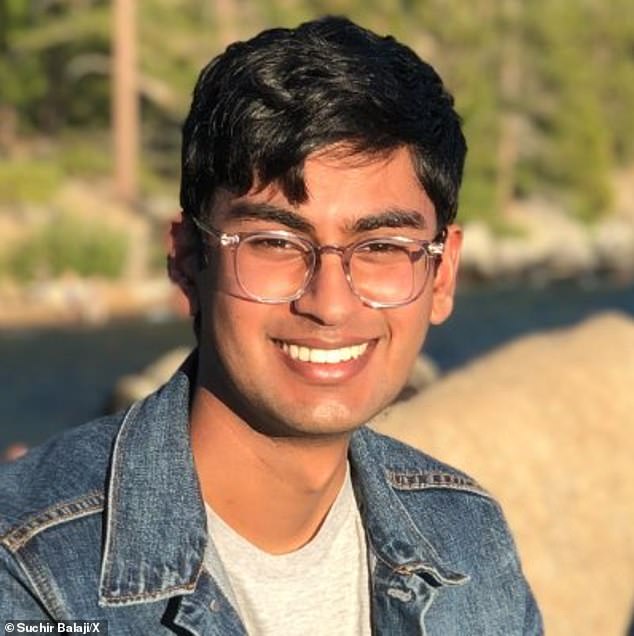Elon Musk has questioned the death of a ChatGPT whistleblower who was found dead by suicide after speaking out against the tech company.
Former OpenAI researcher Suchir Balaji, 26, was found dead on November 26, three months after he accused the company of violating copyright laws in their development of ChatGPT.
Police said they found no evidence of foul play at the scene and ruled the death a suicide. Still, Balaji’s parents, Poornima Ramarao and Balaji Ramamurthy have continued to question the circumstances of their son’s death.
Musk, who co-founded OpenAI in 2015, weighed in on Balaji’s death in December, writing on X, ‘This doesn’t seem like a suicide.’
Tesla’s founder has battled with OpenAI and its CEO, Sam Altman, since they refused his offer to buy them out in 2018. Musk has since slammed OpenAI for accepting $90 billion of funding, saying the commercial enterprise flies in the face of its original mission – to help fight threats to humanity posed by AI.
Musk reposted a video over the weekend of Balaji’s parents’ interview claiming their son had been against the company turning into a for-profit organization.
‘The reason he joined OpenAI was his belief that AI will help humanity. He was very impressed with OpenAI initially because they were nonprofit,’ the grieving mother said.
‘His concern started to become wider as we learn now that when they went public. That’s when his concern started to arise, and he started questioning himself, as he’s mentioned in the interview.’
Former OpenAI researcher Suchir Balaji (pictured), 26, was found dead on November 26, three months after he accused the company of violating copyright laws

Balaji’s parents Poornima Ramarao and Balaji Ramamurthy have continued to question the circumstances of their son’s death

Balaji’s parents are demanding that the FBI look into his death, saying it ‘doesn’t look like a normal situation.’
San Francisco Police Officers were called to his home to conduct a wellness check when they found him deceased.
However, his parents claim there was blood in their son’s bathroom when he was found dead of an apparent suicide.
‘There was nobody else on the scene, that doesn’t mean [police] can just come to conclusion,’ Balaji’s grieving mother said at a vigil for him, as reported by ABC 7.
‘And we have seen the blood shots in the bathroom, signs of fight in the bathroom.’
It’s unclear what photos Balaji’s parents were referencing.
Balaji’s father said he was the last person to talk to him on his birthday week, and his son seemed happy, ‘not depressed or anything.’
‘He made plans to see us in January,’ Ramarao, an engineer at Microsoft, added. ‘That was the last phone conversation he had with anyone…

Balaji’s parents claim their son had been against the company turning into a for-profit organization

‘He went into his apartment and never came out. How can anyone believe that there was no note left?’
Balaji had been a researcher for the artificial intelligence company for four years after joining in 2020.
After the AI system was released in 2022, Balaji began to question if the data that was gathered was an infringement on copyright.
In August, he left OpenAI because he ‘no longer wanted to contribute to technologies that he believed would bring society more harm than benefit,’ reported the New York Times.
‘If you believe what I believe, you have to just leave the company,’ he told the outlet.
Over the past two years, companies like OpenAI have been sued by various individuals and businesses for claims on their copyrighted material.
His role and knowledge in legal proceedings against the company was considered ‘crucial.’
The New York Times was involved in its own lawsuit against OpenAI and its primary partner, Microsoft, who both denied claims that they had used millions of published articles to inform the intelligence and began competing with the outlet as a result.

Musk has slammed OpenAI for accepting $90 billion of funding, saying the commercial enterprise flies in the face of its original mission

Balaji left OpenAI because he ‘no longer wanted to contribute to technologies that he believed would bring society more harm than benefit’
On November 18, the outlet filed a letter in federal court that named Balaji as a person with ‘unique and relevant documents’ that would be used in their litigation against Open AI.
Their suit said: ‘Microsoft and OpenAI simply take the work product of reporters, journalists, editorial writers, editors and others who contribute to the work of local newspapers – all without any regard for the efforts, much less the legal rights, of those who create and publish the news on which local communities rely.’
Whilst other researchers have warned of potential future risks of the technology, such as becoming a danger to humanity, Balaji told the Times that he believes the risk to be far more ‘immediate’ than feared.
He added: ‘I thought that AI was a thing that could be used to solve unsolvable problems, like curing diseases and stopping ageing. I thought we could invent some kind of scientist that could help solve them.’
Balaji said that he believed the threats posed by chatbots, such as ChatGPT, were destroying the commercial viability of the individuals, businesses and internet services that created the digital data used to train such systems.
‘This is not a sustainable model for the internet ecosystem as a whole,’ he said.
dailymail,news,ChatGPT,OpenAI,Tesla,Elon Musk,Sam Altman,Microsoft
#Elon #Musk #questions #suicide #ChatGPT #whistleblower #warned #world
